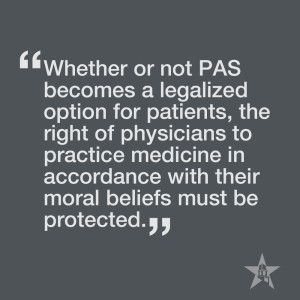Despite recent and increasing political attention, end-of-life issues such as physician-assisted suicide (PAS) and active euthanasia are not new. In ancient Greece, the Hippocratic Oath—which is still used today as a guideline for medical ethics—developed in reaction against the already common practice of providing terminally-ill patients with lethal drugs. Literally meaning “good death”, the Greek word euthanasia has come to describe a practice which I believe, along with PAS, denies patients of their ability to die well by inducing long-lasting, negative impacts on the society that embraces sterilized death. Some of these impacts include the potential deterioration of quality medical care, the misrepresentation of dignity, and the sacrifice of a sacred, inimitable journey that deepens virtue and character.

Whether or not PAS becomes a legalized option for patients, the right of physicians to practice medicine in accordance with their moral beliefs must be protected. If it is not, physicians are reduced from artists of holistic care to simple gatekeepers of medical resources. It is in the patient’s best interest for their physician to be able to act on their conscious, regardless of whether or not PAS is determined to be an ethical practice. The bond of trust between a patient and their doctor is based on the physician’s moral integrity. If a physician is unable to express their moral beliefs through conscientious objection, the patient will receive treatment solely based on social and technological conventions. This degrades the art of medicine, which Sir William Osler, the Father of Modern Medicine, describes as “a calling in which your heart will be exercised equally with your head.” If the expression of personal morality is prohibited, patients may in turn be cheapened to one-dimensional physiological machines in the eyes of their physician. There is a danger of communicating to physicians the unimportance of individual and diverse moral beliefs, which will thereby reduce patients to the sum of their parts.
If the purpose of PAS is to preserve the dignity of the patient, the term ‘dignity’ must be defined. Is dignity an innate standard of physical and mental soundness, or is it a grace granted by onlookers? If it is a certain standard, say, a pain-free, continent existence, then one must consider the questions that arise regarding the worth of individuals who live with disabilities. If it is an external attitude expressed through compassion (which implies shared-suffering) and respect, then the physician’s ability to express morality must be preserved. In most cases, the attitude of the patient’s supporters towards the patient will be a reflection of how the patient lived their life, and not on their impending death and vulnerable presentation.
 This is not to suggest that a patient’s life should be drawn out as long as possible. People can still die a natural death on their own terms— medical treatment can be denied in all circumstances. What modern medical developments have provided are ways to alleviate discomfort, such that natural death can be a peaceful passage. New York Commissioner of Health Dr. Mark R. Chassin states: “People fear losing control over treatment decisions and they fear dying in pain. Those are real fears and they must be addressed. But a humane society owes its citizens something more than a prescription for a quick exit, particularly when we have the ability to control pain effectively and to successfully treat the depression that often causes patients to believe that suicide is their only option.” A humane society owes its citizens the ability to experience the strengthening of the human spirit as can only happen by a journey of death and suffering (referring to more than avoidable physical pain)—a truth which causes much of the Western world to cringe. The Evangelical Fellowship of Canada explains it well, stating that “it is when we are willing to care for one another under the most dire of circumstances and at the cost of great inconvenience that human dignity and society’s fundamental goodness are best expressed and preserved”.
This is not to suggest that a patient’s life should be drawn out as long as possible. People can still die a natural death on their own terms— medical treatment can be denied in all circumstances. What modern medical developments have provided are ways to alleviate discomfort, such that natural death can be a peaceful passage. New York Commissioner of Health Dr. Mark R. Chassin states: “People fear losing control over treatment decisions and they fear dying in pain. Those are real fears and they must be addressed. But a humane society owes its citizens something more than a prescription for a quick exit, particularly when we have the ability to control pain effectively and to successfully treat the depression that often causes patients to believe that suicide is their only option.” A humane society owes its citizens the ability to experience the strengthening of the human spirit as can only happen by a journey of death and suffering (referring to more than avoidable physical pain)—a truth which causes much of the Western world to cringe. The Evangelical Fellowship of Canada explains it well, stating that “it is when we are willing to care for one another under the most dire of circumstances and at the cost of great inconvenience that human dignity and society’s fundamental goodness are best expressed and preserved”.
Let us then learn to die well—embracing physician integrity, true patient dignity, and an unparalleled opportunity to journey in courage, strength, and compassion.

One reply on “Response: The Right to Die (With Dignity)”
Well done. May I add that I take exception to the polling on legalizing assisted suicide.
I have found (serving 60 fair booth days) that about half of the public thinks they are in favor of such a law, that is until they learn about the flaws in the laws that create new paths of elder abuse with immunity. Once they learn that a predatory heir may steer the signup process and then forcibly administer the lethal dose without oversight, they all said, “I am not for that!”.
Anyway all of these Oregon Model bills have the same flaws that work together to eviscerate flaunted safe guards.
For example how many times have you nodded your head when the proponents declared that the lethal dose must be self-administered?
Well, read the language of the law/bill and you will find that there is no means provided to insure that marketing point. For example “self-administrate” was mentioned 11 times in the 8 page Minnesota SF 1880 and yet there was no means provided to confirm that the lethal dose was forced on not, who would know if they struggled and not consented.
In fact what is provided is that there may be no investigations allowed after the death (page 6 of 8 Subd. 12. In addition allowing a stranger that claims to know how the person communicates may speak for them eviscerates all the intended safeguards, page 1 of 8 (e).
Along with allowing predatory heirs and staff to witness even as other family members are not required to be contact.
This is a very dangerous public policy that by their own records in OR and WA is establishing poisoning as the “medical standard of care” for people that have “feelings” of fear of the loss of autonomy.
We are all at risk of abuse by these poorly composed laws/bills.
Respectfully submitted,
Bradley Williams
President
MTaas dot org